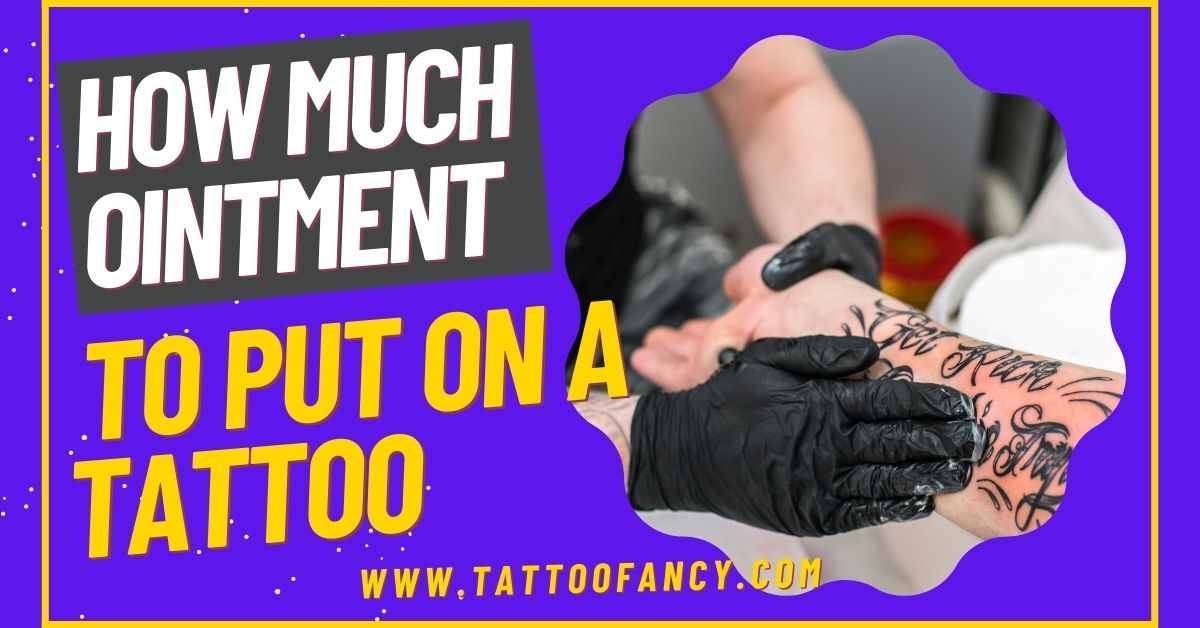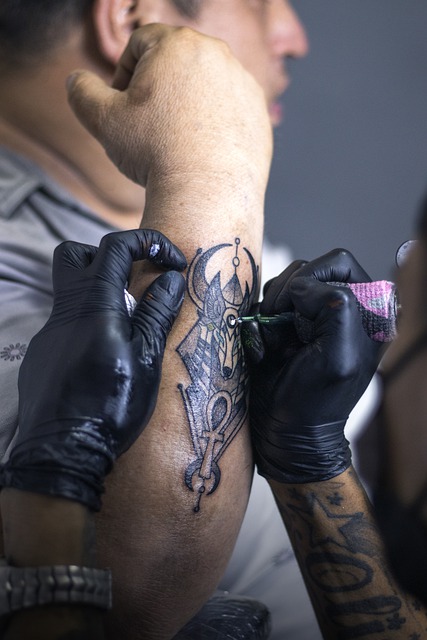How Much Ointment to Put On A Tattoo?: When applying ointment to a new tattoo. You want to apply a thin layer of ointment to the tattooed area. Over-application of ointment can lead to clogged pores, which may hinder the healing process and increase the risk of infection.
A good rule of thumb is to use only enough ointment to lightly coat the tattooed skin. You should be able to see the tattoo through the ointment after application. If it looks too thick or greasy, you’ve likely applied too much.
Your tattoo artist may provide specific instructions on the amount of ointment to use and how frequently to apply it. Most tattoo artists give instructions to apply ointment 2-3 times a day. But it depends on your skin type and the healing progress of your tattoo.
Always wash your hands before applying ointment to avoid introducing bacteria to the tattooed area. Use a clean, disposable applicator or your fingers to apply the ointment, and be sure to gently massage it into the skin until it’s fully absorbed.
If you have any concerns about how much ointment to use or how often to apply it, don’t hesitate to consult with your tattoo artist or a medical professional for guidance. Following proper tattoo aftercare instructions is crucial for ensuring your tattoo heals correctly and looks its best in the long run.
Ointment For Tattoos: Which Type Of Ointment Is Best For Your Tattoo?
There are many types of ointments available for tattoo care. Oil-free ointments are best for people with sensitive skin. These ointments do not contain any oils and are good for people who are prone to developing skin irritations. They are also good for people who want to keep their tattoos fresh and new looking. Cream-type ointments are best for people with dry skin. These ointments contain a lot of oils and are good for people who want to keep their tattoos moisturized. They are also good for people who want to keep their tattoos looking shiny. The last type of ointment is a gel-type ointment. These ointments are a little bit more expensive but are good for people who want to keep their tattoos moisturized and looking new.
The Risks And Benefits Of Ointment For Tattoos
Tattoos are a common feature on many people’s bodies, and they can be a beautiful addition to the individual. However, they can also be a risky investment. The risks associated with tattoos include the potential for infection, damage to the skin, and even cancer. Additionally, ointment for tattoos can provide some benefits that should be considered before investing in this type of permanent decoration. Here are four of the most important reasons to consider using ointment for tattoos:
- They Can HELP Soothe The Skin: Ointment for tattoos can help to soothe the skin when applied correctly. This is due to its ability to reduce inflammation and keep the skin healthy and hydrated. Additionally, it can help improve vision by helping to reduce glare and reflections on tattoos.
- It Can Help With Post-Tattoo Care Ointment for tattoos can help to address the post-tattoo care of the skin by ensuring that it is moisturized. It can also help to prevent new infections from occurring.
.
- There are both risks and benefits to using ointment for tattoos. The main benefit is that it can help to speed up the healing process and reduce the risk of infection. However, it is important to be aware that using an ointment can also increase the risk of the tattoo becoming irritated or developing an allergic reaction. If you are considering using an ointment, it is important to speak to your tattoo artist and healthcare provider first to make sure it is the right choice for you.
Tips For Putting Ointment On A Tattoo
Ointment is an important part of tattooing. It helps to keep the tattoo area clean and healthy, and can help to reduce the risk of infection. Here are some tips for putting ointment on a tattoo:
1. Apply a thin layer of ointment to the tattooed area.
2. Gently massage the ointment into the skin.
3. Repeat this process 2-3 times per day, or as directed by your tattoo artist.
4. Be sure to wash your hands before and after applying the ointment.
5. Use a clean, dry cloth to remove any excess ointment.
6. Allow the tattooed area to air dry for a few minutes before applying clothing.
By following these simple steps, you can help ensure that your new tattoo heals properly and looks its best.
Final thought
As a general rule, you should put on enough ointment to keep your tattoo moist, but not so much that it seeps. A good way to gauge how much ointment to put on is to apply it in a thin layer, just enough to cover the tattooed area without being too heavy-handed.
If you have a tattoo, you should make sure to keep it clean and moisturized. You should also avoid exposing it to sunlight and other sources of UV light, as this can cause the tattoo to fade. If you notice any signs of infection, such as redness, swelling, or discharge, you should see a doctor right away.


